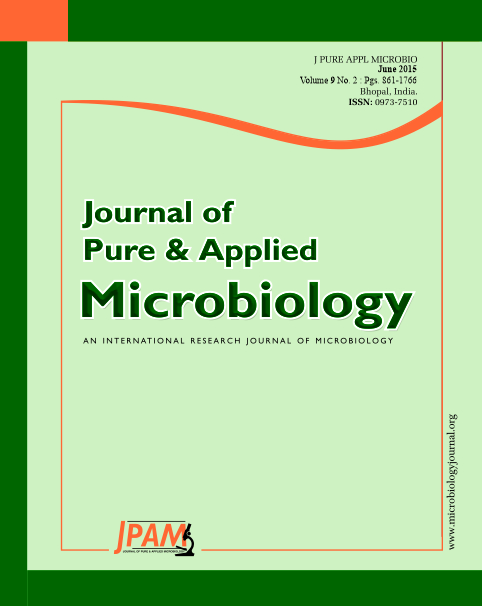Hot spring bacteria are found a novel source of highly active xylanase enzyme with significant activity at high temperature. There has been a great interest in microbial xylanases due to their numerous uses in industrial applications, such as biobleaching of pulp and most notably the conversion of lignocellulosic materials into fermentable substrates for production of economical and environmentally attractive biofuels. In this study, thermophilic xylanase (EC 3.2.1.8) producing microbes were screened from diverse thermal sites such as Manikaran and Tattapani of western Himalyas. Among the isolates, 13 were selected for interested enzyme production (xylanase). Only single isolate namely TP 28 showed maximum xylanase activity at 60p C. Isolate TP 28 was confirmed as Bacillus sp. on the basis of colony morphology, stained preparation, biochemical tests as well as 16S rRNA sequencing and showed 99% similarity to Bacillus aestuarii (Accession No. AB062696). This is the first study in which we had reported that Bacillus sp. which has 99% similarity to Bacillus aestuarii is able to produce xylanase. Growth conditions including temperature, pH, incubation time, carbon sources, nitrogen sources were studied sequentially using the classical “change-one factor at a time” method. After optimizing all the parameters this xylanase producing isolate showed 10-fold increase in enzyme activity. Response Surface Methodology was used to generate the process model for obtaining optimal conditions for selected nitrogen sources, carbon sources and metal ion for maximum xylanase production and showed 10% increase in enzyme activity. Thermophilic and alkaline nature of TP28 are of great importance for converting lignocellulosic agricultural waste products into fermentable sugars for production of biofuel. Thermoalkalophilic nature of xylanase produced from a new Bacillus sp. make it of special industrial interest.
Xylanase, Bacillus, 16S rRNA, Thermoalkalophilic, Biofuel, Response Surface Methodology
© The Author(s) 2015. Open Access. This article is distributed under the terms of the Creative Commons Attribution 4.0 International License which permits unrestricted use, sharing, distribution, and reproduction in any medium, provided you give appropriate credit to the original author(s) and the source, provide a link to the Creative Commons license, and indicate if changes were made.


